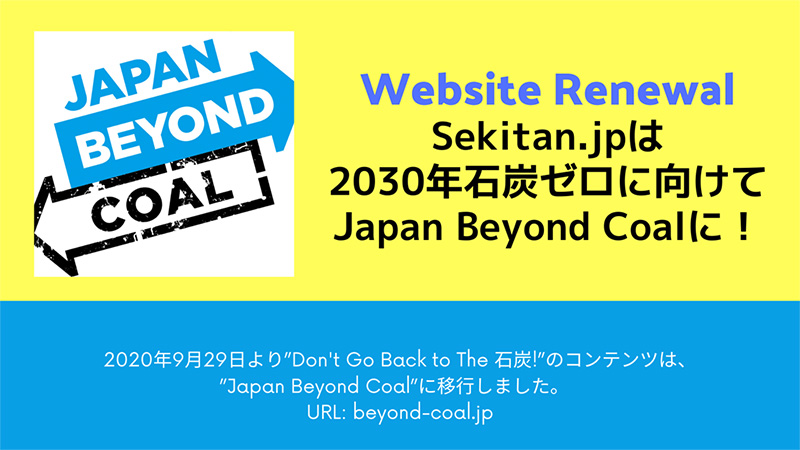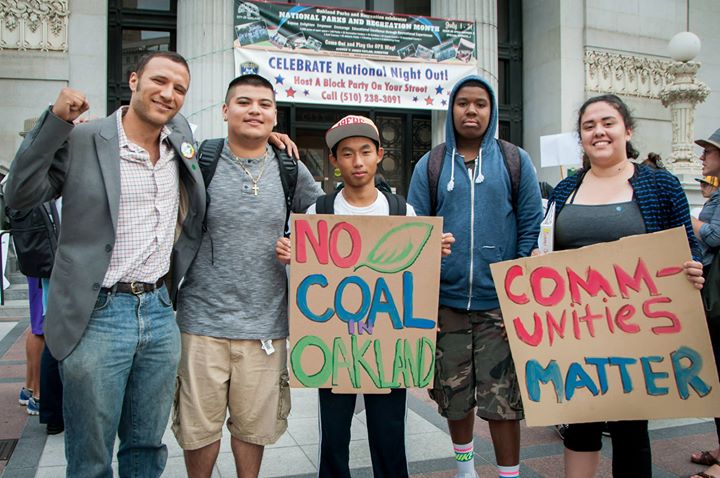[:ja]日本は国内で利用する石炭を輸入に頼っています。世界的に脱石炭が進む中、石炭火力発電に依存する日本向けの石炭輸出を止めようとする活動が海外で起こっています。ここでは、米国カリフォルニア州オークランド市において、毎年数百万トンの石炭を日本に輸出することを止めるための活動をしている地域団体「No Coal in Oakland (NCIO)」を紹介します。NCIOは、港湾ターミナルの計画を阻止することで石炭の輸出を止めようとしています。
No Coal in Oakland (NCIO)
サンフランシスコ湾東海岸、オークランド市内にバルク商品用港湾ターミナルの建設計画があります。私たちは2015年に開発業者たちが秘密裏にそのターミナルを石炭輸出に使用する計画を立てていることを知り、このターミナルから石炭を排除するためにNo Coal in Oakland (NCIO)を組織しました。NCIOはコミュニティに根ざした組織です。
なぜ石炭が問題か
石炭は、輸送、貯蔵、利用のいずれの工程からも粉塵が発生します。石炭からの粉塵はPM10やPM2.5のような微粒子を含み、深刻な病や死因となることが知られています。これらの微粒子は炎症を起こすことで、肺、心臓、血管を傷つけます。その結果、心臓発作、心筋梗塞、喘息、認知症、糖尿病、その他の健康問題をもたらします。すなわち石炭は、採鉱者や、炭鉱と火力発電所の側に住む人々を死に至らしめます。そしてそのサプライチェーンのすべてにおいて、病や死をもたらすものです。
提案されているターミナルはオークランド港に隣接することになります。オークランド港は長きに渡って汚染物質を多く排出するディーゼルトラックの交通量が集中してきた場所です。このことは港と提案されているターミナルの側に住む西オークランドの住民に不当な健康被害を生じさせています。私たちのコミュニティでは、港の運用に伴う汚染を減らすために活動してきており、これまでにいくつかの点で進展をみてきました。だからこそ私たちは、毒性のある石炭粉塵によって再び後戻りさせられ、これ以上私たちの健康を害することを認めることはできません。
開発業者の主張
オークランドバルクおよび大型貨物用ターミナル(OBOT)の建設はオークランド市によって認可されました。OBOTはコンテナ船のみを扱うオークランド港では扱えない商品の輸出を可能にします。これまで何年も開発業者たちは地域コミュニティに対して、ターミナルは石炭を扱わないと請け合ってきました。しかしコミュニティのメンバーは2015年4月に開発業者が秘密裏にユタ州で採掘された石炭を輸出する計画を立てていたことを知りました。NCIO はこの計画に反対するために設立されました。私たちはオークランドバルクおよび大型貨物用ターミナル(OBOT)の建設とそれがもたらす雇用については支持しています。しかし、私たちは石炭輸出がこのプロジェクトを成立させるために必要であるとの開発業者の主張を認めません。また私たちは石炭を取り扱わなければより少ない雇用が創出されるという彼らの主張も認めません。環境正義と気候保護は、オークランド市臨海部の再開発と両立されなければなりません。
NCIOの活動と市議会の戦い
NCIOによるターミナルを石炭のために使うことへの反対は数千人のオークランド市民、無数の地域の労働組合、宗教指導者、医療関係者、コミュニティ組織、市および州の政府関係者、そして国内外の環境正義に関する組織の賛同を得ています。
オークランド市議会は、2016年の公聴会において、石炭粉塵によって隣接するコミュニティの住民が受ける健康被害についての科学的証拠を検討しました。その後、市議会は全会一致で石炭の貯蔵と取り扱いを市の全域で禁じる政令を定めました。私たちは西オークランドにさらにもう一つの新たな汚染源が増えることから我々の地域を保護した市議会を称賛します。
開発業者は訴訟を起こしており、判決はターミナルの今後に強い影響を与えます。一方で、ターミナルのオペレータ予定業者は複数の日本企業と商談を行っています。日本の火力発電会社であるJERAは、国内の石炭火力発電所で利用するために400万トンの石炭の購入保証について協議しています。三井住友銀行(SMBC)は、総額約2億4,000万ドルのターミナル建設費用の融資について協議しています。SMBCの関与は、同社が最近発表した石炭に対する融資を制限する方針に抵触するものです。石炭に関するインフラへのいかなる融資であっても、それは石炭火力発電の今後の運用への融資と同じことです。もしSMBCが石炭ターミナルとしてのオークランドバルクおよび大型貨物用ターミナルへの融資を検討しているのであれば、それは大規模な国際的な抗議に直面するでしょう。
NCIOは今後も、気候ネットワークや他の団体と協力して、カリフォルニア、日本、そして地球上のコミュニティに対する脅威に立ち向かっていきたいと考えています。
キャンペーンについてのより詳細な情報はNoCoalinOakland.infoをご参照下さい。[:en]Since Japan has no domestic sources of coal, it relies heavily on coal imports. As the world pushes forward with anti-coal movements, these include movements to stop exporting coal to Japan. No Coal in Oakland (NCIO), in Oakland, California, USA, is a grassroots organization working to stop the export of millions of tons of coal to Japan each year. NCIO aims to prevent the plan of a port terminal to be used for exporting coal.
No Coal In Oakland (NCIO)
No Coal In Oakland (NCIO) is a community organization working to prevent a planned marine terminal in Oakland, California from exporting millions of tons of coal to Japan each year.
A bulk-commodities marine terminal is planned for Oakland on the east shore of San Francisco Bay. In 2015 we learned that the developers were secretly discussing using the terminal for coal. No Coal in Oakland (NCIO) came together then to keep coal out of the terminal. NCIO is a community-based organization.
Why is coal a problem?
Coal kills miners and people living near coal mines and power plants. It also sickens and kills all along the supply chain. The transportation, storage, and handling of coal all release coal dust. The dust includes microscopic particles, PM10 and PM2.5, that are known to cause severe illness and death. These particles cause inflammation and damage the lungs, heart, and blood vessels. This leads to heart attacks, strokes, asthma, dementia, diabetes, and many other health problems.
The proposed terminal would be adjacent to the Port of Oakland. The Port of Oakland has long been a center for highly-polluting diesel truck traffic. This has caused disproportionately negative health impacts for the residents of West Oakland, who live near the Port and proposed terminal. Our community is fighting to reduce the pollution caused by the Port’s activities. We have made some progress. We will not allow toxic coal dust to take us backward and further threaten our health.
Developers’ claims
Construction of the terminal–Oakland Bulk and Oversized Terminal (OBOT)–was approved by the City of Oakland. OBOT would allow export of commodities that cannot be shipped through the Port of Oakland, which only handles container ships. For years the developers assured the community that the terminal would not handle coal. But community members learned in April 2015 that developers had secretly planned to export coal mined in the state of Utah. NCIO was established to challenge this plan. We support the construction of the Oakland Bulk and Oversized Terminal and the jobs it will bring. But we reject the developer’s claim that coal shipment is needed to sustain the project. We also reject the claim that fewer jobs will be created if coal is excluded. Environmental justice and protection of the climate must go hand-in-hand with redevelopment of Oakland’s waterfront.
Challenging the terminal plan
NCIO was joined in opposition to the use of the terminal for coal by thousands of city residents; numerous local labor unions, faith leaders, health professionals and community organizations; local and state officials; and national and international environmental justice organizations.
During public hearings in 2016, the Oakland City Council heard scientific evidence that coal dust would harm the health of residents of the neighboring community. The City Council then unanimously enacted a city-wide ban on the storage and handling of coal. We applaud our city government for protecting our community from the addition of yet another source of toxic pollution in West Oakland.
The developer sued, and the court’s decision will have a strong influence on the future of the terminal. Meanwhile, the prospective operator of the terminal has been in discussions with Japanese businesses. Japanese major power supplier JERA discussed guaranteeing purchase of up to 4 million metric tons of coal per year to be burned in Japanese power generation plants. Sumitomo Mitsui Banking Corporation (SMBC) discussed financing the full construction cost of the terminal, approximately $240 million. SMBC’s involvement conflicts with its newly-announced policy to limit investment in coal. Any investment in coal infrastructure is an investment in future operation of coal-fired power plants. If SMBC is contemplating financing the Oakland Bulk and Oversized Terminal as a coal terminal, it will face substantial international opposition.
NCIO looks forward to ongoing collaboration with Kiko Net and others to fight this threat to communities in California, Japan, and around the globe.
Further details about the campaign can be found at NoCoalinOakland.info.
[:]


